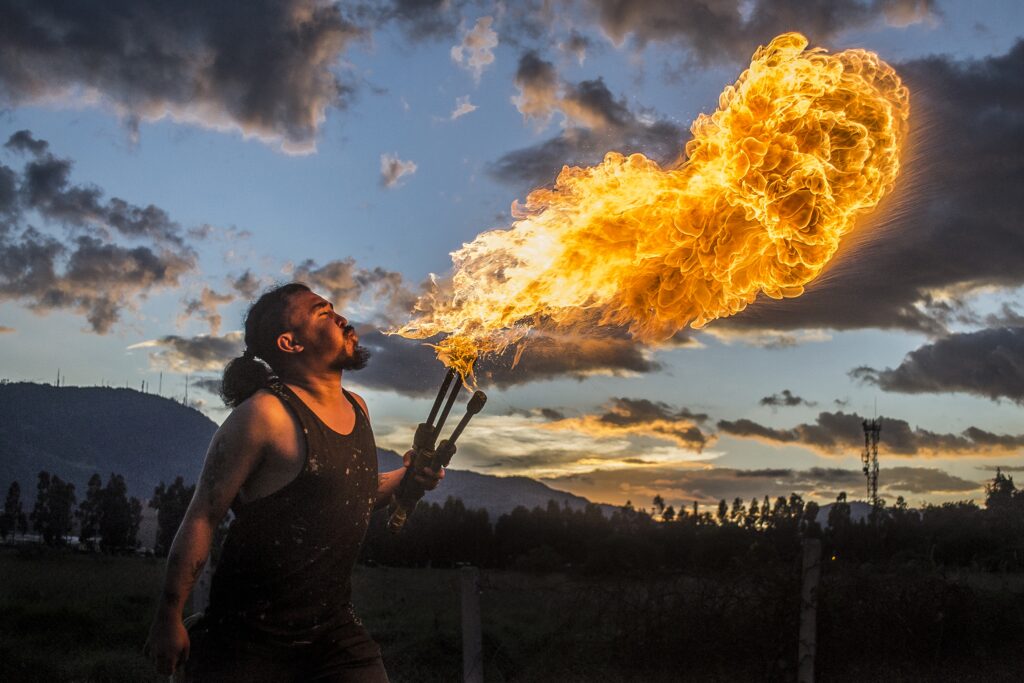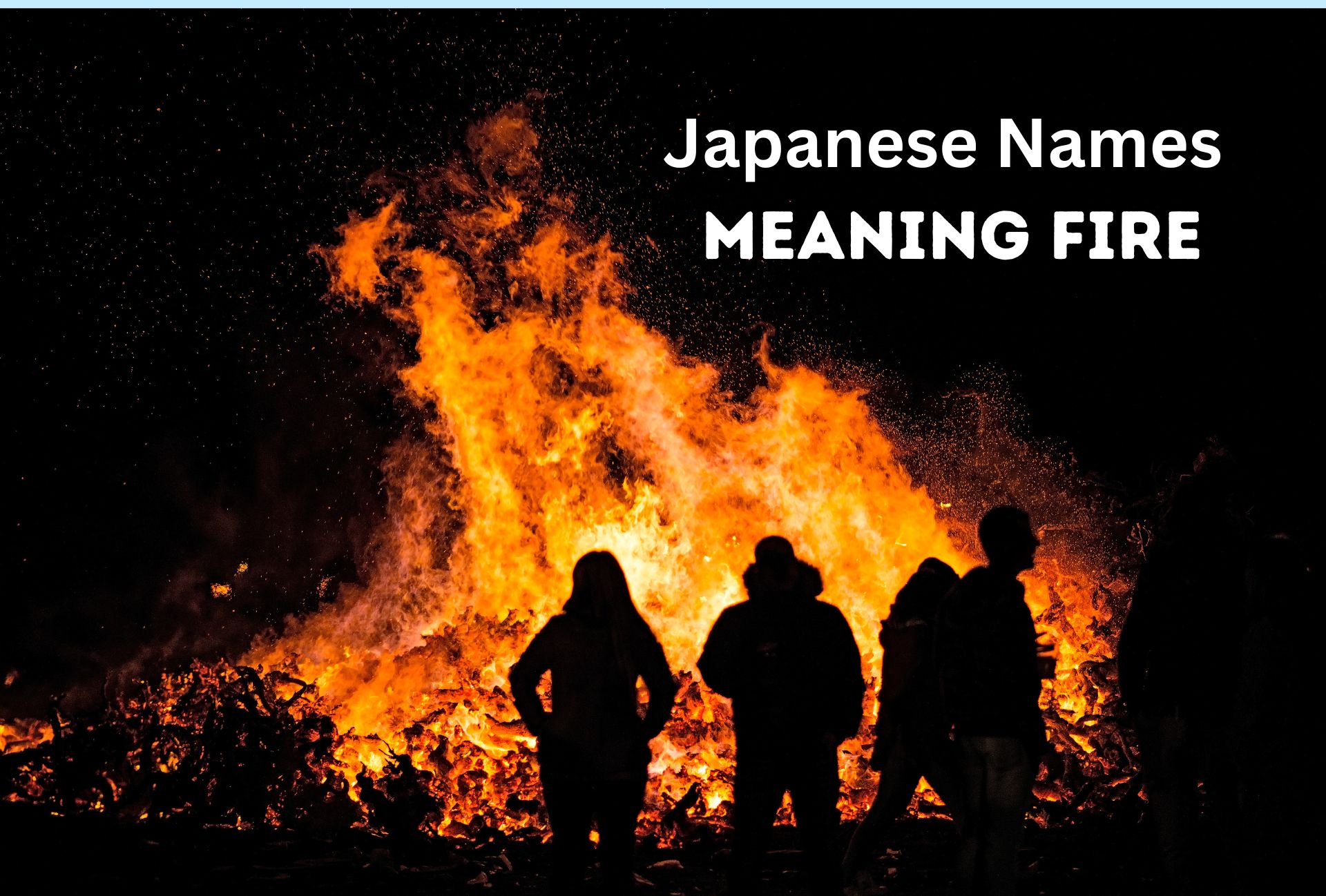Choosing a Japanese first names meaning fire for a child is an exciting and meaningful task. In Japan, names often carry profound meanings and are influenced by cultural elements, nature, and mythology. Among the many themes, names meaning fire hold a special place due to their dynamic and powerful meanings.
An Overview of Japanese First Names Meaning Fire
In Japanese culture, names hold a profound significance. They are not just labels but also represent aspirations, values, and often, elements of nature. Names that mean “fire” are fascinating as they symbolize passion, energy, and transformation.
The Element of Fire in Japanese Culture
Fire, or “hi” (火) in Japanese, plays a crucial role in various aspects of Japanese tradition and modern life. Historically, fire has been seen as a force of both creation and destruction.
Fire in Japanese Mythology
Fire holds a significant place in Japanese mythology. One of the central deities, Kagutsuchi, is the god of fire. His birth was said to have caused the death of his mother, Izanami, which led to significant events in the mythological history of Japan. Fire, thus, is seen as both a life-giving and a potentially destructive force.
Fire Festivals and Traditions
Fire festivals, such as the famous Awa Odori, celebrate the vitality and communal spirit associated with fire. These festivals often feature vibrant dances, torches, and fireworks, symbolizing the joy and warmth fire brings to human gatherings
Symbolism of Fire in Japanese Art and Literature
In Japanese art and literature, fire symbolizes various human emotions and experiences, from love and anger to purification and renewal. It is often described in poetry and paintings as a powerful natural element that shapes the human condition.
75 Japanese First Names Meaning Fire
Here, is the list of Japanese names meaning fire, perfect for those seeking names with strong and dynamic meanings.
Popular Japanese First Names Meaning Fire
- Akari (明里) – Meaning “light” or “brightness,” often symbolizing the warm glow of fire.
- Hinata (日向) – Meaning “sunny place” or “towards the sun,” symbolizing warmth and brightness.
- Homura (焔) – Directly translating to “flame,” embodying the essence of fire.
- Kaen (火炎) – Meaning “flame,” straightforward and powerful.
- Rekka (烈火) – Meaning “raging fire” or “fierce flames.”
- Natsu (夏) – Meaning “summer,” a season of warmth and heat.
- Kohaku (琥珀) – Meaning “amber,” a warm, fiery gemstone.
- Ren (蓮) – Often associated with the lotus flower, but also means “burning love.”
- Tatsuya (竜也) – Combining “dragon” (竜) and “valley” (也), embodying fiery might.
- Moe (萌) – Meaning “budding” or “sprouting,” can imply the spark of a growing flame.
Popular Japanese Girls First Names Meaning Fire

- Akari (明里) – Meaning “light” or “brightness.”
- Ayaka (彩花) – Combining “color” (彩) and “flower” (花), symbolizing vibrant flames.
- Hinata (日向) – Meaning “sunny place” or “towards the sun,” symbolizing warmth and brightness.
- Hotaru (蛍) – Meaning “firefly,” a small light in the darkness.
- Kaede (楓) – Meaning “maple,” a tree with fiery autumn leaves.
- Kaho (香穂) – Combining elements meaning “fragrance” (香) and “grain” (穂), suggesting the warmth of a fragrant harvest.
- Koharu (小春) – Meaning “small spring,” but can imply warmth.
- Mio (美桜) – Meaning “beautiful cherry blossom,” symbolizing the warmth of spring.
- Natsumi (夏美) – Meaning “beautiful summer.”
- Nozomi (望) – Meaning “hope,” a warm, bright feeling.
- Ren (蓮) – Often associated with the lotus flower, but also means “burning love.”
- Sakura (桜) – Meaning “cherry blossom,” symbolizing fleeting beauty like a flame.
- Satsuki (五月) – Meaning “fifth month,” a warm time of the year.
- Saya (沙耶) – Meaning “sand” (沙) or “swift arrow” (耶), swift like a flame.
- Shiori (詩織) – Meaning “poem” (詩) or “weaving” (織), symbolizing creativity like fire.
- Yuka (優花) – Meaning “gentle flower,” but can imply a warm, nurturing presence.
- Aika (愛花) – Combining “love” (愛) and “flower” (花), symbolizing the warmth of emotions.
- Aiko (愛子) – Meaning “child of love,” embodying warmth and affection.
- Aimi (愛美) – Meaning “love” (愛) and “beauty” (美), suggesting a bright, warm-hearted person.
- Asuka (明日香) – Meaning “tomorrow’s fragrance,” evoking a sense of burning incense.
- Chie (智恵) – Meaning “wisdom,” often associated with enlightenment and clarity like fire.
- Emi (恵美) – Meaning “beautiful blessing,” symbolizing a radiant presence.
- Fumiko (文子) – Meaning “child of abundant beauty,” with an implied warmth.
- Hana (花) – Meaning “flower,” symbolizing beauty and the warmth of spring.
- Haruka (春花) – Meaning “spring flower,” evoking the warmth of the season.
- Jun (純) – Meaning “pure,” symbolizing the clarity of fire.
- Kasumi (霞) – Meaning “mist,” but can imply the transformative power of fire.
- Mika (美香) – Meaning “beautiful fragrance,” symbolizing the warmth of burning incense.
- Rina (里奈) – Meaning “jasmine,” a flower associated with warmth and beauty.
- Yui (結衣) – Meaning “bind” (結) or “tie” (衣), symbolizing the bonds of warmth and connection.
Popular Japanese Boys First Names Meaning Fire

- Hikaru (光) – Meaning “light” or “radiance,” associated with the brightness of fire.
- Kaoru (薫) – While it means “fragrance,” it can symbolize the burning incense.
- Rekka (烈火) – Meaning “raging fire” or “fierce flames.”
- Tatsuya (竜也) – Combining “dragon” (竜) and “valley” (也), embodying fiery might.
- Natsu (夏) – Simply means “summer,” a season of warmth and heat.
- Atsushi (篤志) – Meaning “fervent” or “passionate,” akin to the heat of fire.
- Hayato (隼人) – Meaning “fast” or “brisk,” like a quickening flame.
- Kazuho (和火) – Combining elements that mean “fire” (火) and “harmony” (和).
- Homura (焔) – Directly translating to “flame,” embodying the essence of fire.
- Kohaku (琥珀) – Meaning “amber,” a warm, fiery gemstone.
- Ren (蓮) – Often associated with the lotus flower, but also means “burning love.”
- Kaito (海斗) – Combining “ocean” (海) and “fly” (斗), symbolizing dynamic elements.
- Masaru (勝) – Meaning “victory,” often symbolized by a conquering fire.
- Rei (怜) – Meaning “spirit” or “cool,” but in some contexts, “ray” of light.
- Shin (真) – Meaning “real” or “true,” a pure fire.
- Sora (空) – Meaning “sky,” where the sun burns brightly.
- Akihiko (明彦) – Meaning “bright prince.”
- Akinori (昭憲) – Meaning “bright and shining.”
- Akito (明人) – Meaning “bright” (明) and “clear” (人).
- Chiharu (千春) – Meaning “thousand springs,” symbolizing endless warmth.
- Daiki (大樹) – Meaning “great tree,” can symbolize burning wood.
- Hinata (日向) – Meaning “sunny place” or “towards the sun,” symbolizing warmth and brightness.
- Isamu (勇) – Meaning “courage,” a fiery spirit.
- Jiro (二郎) – Meaning “second son,” with an implied familial warmth.
- Kaen (火炎) – Meaning “flame,” straightforward and powerful.
- Kazuki (和希) – Meaning “harmony” (和) and “hope” (希), but with a warm undertone.
- Ryu (竜) – Meaning “dragon,” a fire-breathing creature.
- Seiji (誠司) – Meaning “lawful” (誠) and “second” (司), but can also imply a guiding light.
- Takao (隆夫) – Meaning “brave man,” with a fiery courage.
- Tatsuo (竜雄) – Combining “dragon” (竜) and “man” (雄), symbolizing fiery strength.
Popular Japanese Unisex First Names Meaning Fire
- Akira (明) – Meaning “bright” or “clear,” symbolizing the light of fire.
- Haru (春) – Meaning “spring,” but also a time of warmth and renewal.
- Hikaru (光) – Meaning “light” or “shine,” embodying the brightness of fire.
- Kohaku (琥珀) – Meaning “amber,” a warm and fiery gemstone.
- Moe (萌) – Symbolizing “burning passion” or “budding flames”.
- Rei (怜) – Meaning “spirit” or “cool,” but in some contexts, “ray” of light.
- Ren (蓮) – Meaning “Burning Love.”
- Sora (空) – Meaning “sky,” where the sun burns brightly.
- Tamaki (珠貴) – Meaning “jewel” (珠), often associated with the fiery brilliance of precious stones.
- Yuki (雪) – Meaning “snow,” but in a context of contrast, it emphasizes the warmth of fire.
Frequently Asked Questions ( FAQ’s )
What is the cultural significance of the element of fire in Japanese names?
Fire represents energy, passion, and transformation. In Japanese names, it signifies a person's vibrant personality and their potential to bring about change.
How are Japanese names typically chosen?
Japanese names are chosen based on their meanings, the number of strokes in the kanji characters, and sometimes astrological factors. Parents often select names that reflect their hopes and wishes for their child's future.
Are there any famous Japanese personalities with names meaning fire?
Yes, many historical and contemporary figures have names related to fire, symbolizing their dynamic and influential personalities. Examples include actors, athletes, and artists whose names embody strength and vitality.
How do Japanese names reflect personal traits or expectations?
Japanese names often reflect personal traits or the expectations parents have for their children. A name meaning "fire" might suggest a lively, passionate individual with a strong presence.
Can non-Japanese people use Japanese names?
While non-Japanese individuals can use Japanese names, it's important to understand the cultural significance
The Bottom Line
Japanese names meaning fire are rich in cultural significance, embodying qualities of passion, strength, and transformation. Whether you’re looking for a name for a boy, girl, or unisex option, these names offer a unique glimpse into the cultural importance of fire in Japan.
From mythology and festivals to art and literature, the element of fire plays a vital role in shaping Japanese identity and values.
By choosing a name that signifies fire, you not only bestow a powerful and dynamic meaning but also connect with a rich cultural heritage that celebrates the warmth and energy of this vital element.
